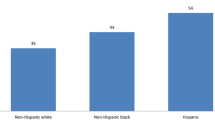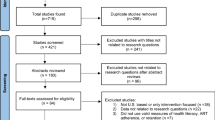Abstract
Racial disparities in HIV/AIDS are well established and efforts to understand key factors that may explain these differences are needed. Recent evidence suggests that health literacy may contribute to disparities in health behaviors among African American HIV patients. One component of health literacy, numeracy, is emerging as an important skill for successful self management of medications. We therefore tested whether numeracy mediated the effects of race on medication management among HIV seropositive patients. Results showed that poor management of a simulated HIV medication regimen among African Americans and women was mediated by lower numeracy. Poor medication self-management may be a significant root cause for health disparities in African Americans with HIV/AIDS. Whether African American women may be at particular risk requires further study. Interventions to improve HIV medication self-management through addressing numeracy skills may help to narrow the gap in health disparities among African Americans with HIV/AIDS.


Similar content being viewed by others
References
CDC. HIV/AIDS surveillance report, Vol. 17, Rev. ed. US Department of Health and Human Services; 2007.
Fullilove RE. African Americans, health disparities and HIV/AIDS—recommendations for confronting the epidemic in Black America. Washington, DC: National Minority AIDS Council; 2006.
Sudore RL, Yaffe K, Satterfield S, et al. Limited literacy and mortality in the elderly: the health, aging, and body composition study. J Gen Intern Med. 2006;21(8):806–12.
Kalichman SC, Benotsch E, Suarez T, et al. Health literacy and health-related knowledge among persons living with HIV/AIDS. Am J Prev Med. 2000;18(4):325–31.
Kalichman SC, Rompa D. Functional health literacy is associated with health status and health-related knowledge in people living with HIV-AIDS. J Acquir Immune Defic Syndr. 2000;25(4):337–44.
Arnsten JH, Demas PA, Grant RW, et al. Impact of active drug use on antiretroviral therapy adherence and viral suppression in HIV-infected drug users. J Gen Intern Med. 2002;17(5):377–81.
Miller LG, Liu H, Hays RD, et al. Knowledge of antiretroviral regimen dosing and adherence: a longitudinal study. Clin Infect Dis. 2003;36(4):514–8.
Stone VE, Hogan JW, Schuman P, et al. Antiretroviral regimen complexity, self-reported adherence, and HIV patients’ understanding of their regimens: survey of women in the her study. J Acquir Immune Defic Syndr. 2001;28(2):124–31.
Osborn CY, Paasche-Orlow MK, Davis TC, Wolf MS. Health literacy: an overlooked factor in understanding HIV health disparities. Am J Prev Med. 2007;33(5):374–8.
MacLaughlin EJ, Raehl CL, Treadway AK, et al. Assessing medication adherence in the elderly: which tools to use in clinical practice? Drugs Aging. 2005;22(3):231–55.
Kripalani S, Henderson LE, Chiu EY, et al. Predictors of medication self-management skill in a low-literacy population. J Gen Intern Med. 2006;21(8):852–6.
Wolf MS, Davis TC, Shrank W, et al. To err is human: patient misinterpretations of prescription drug label instructions. Patient Educ Couns. 2007;67(3):293–300.
Davis TC, Wolf MS, Bass PFIII, et al. Low literacy impairs comprehension of prescription drug warning labels. J Gen Intern Med. 2006;21(8):847–51.
Davis TC, Wolf MS, Bass PFIII, et al. Literacy and misunderstanding prescription drug labels. Ann Intern Med. 2006;145(12):887–94.
Rothman RL, Housam R, Weiss H, et al. Patient understanding of food labels: the role of literacy and numeracy. Am J Prev Med. 2006;31(5):391–8.
Waldrop-Valverde D, Jones DL, Jayaweera D, et al. Gender differences in medication management capacity in HIV infection: the role of health literacy and numeracy. AIDS Behav. 2009;13(1):46–52.
Golbeck AL, Ahlers-Schmidt CR, Paschal AM, Dismuke SE. A definition and operational framework for health numeracy. Am J Prev Med. 2005;29(4):375–6.
Cavanaugh K, Huizinga MM, Wallston KA, et al. Association of numeracy and diabetes control. Ann Intern Med. 2008;148(10):737–46.
Estrada CA, Martin-Hryniewicz M, Peek BT, Collins C, Byrd JC. Literacy and numeracy skills and anticoagulation control. Am J Med Sci. 2004;328(2):88–93.
Woodcock R, McGrew K, Mather N. Woodcock Johnson III tests of achievement. Itasca, IL: Riverside; 2001.
Parker RM, Baker DW, Williams MV, Nurss JR. The test of functional health literacy in adults: a new instrument for measuring patients’ literacy skills. J Gen Intern Med. 1995;10(10):537–41.
Taylor WS. Cloze procedure: a new test for measuring readability. Journal Q. 1953;38:632–7.
Albert SM, Weber CM, Todak G, et al. An observed performance test of medication management ability in HIV: relation to neuropsychological status and medication adherence outcomes. AIDS Behav. 1999;3(2):121–8.
Ridgon E. CFI versus RMSEA: comparison of two fit indexes for structural equations modeling. Struct Equ Model. 1996;3:369–79.
Kline R. Principles and practice of structural equation modeling. New York: Guilford; 2004.
Loehlin JC. Latent variable models: an introduction to factor, path, and structural analysis. Hillsdale, NJ: Lawrence Erlbaum; 1992.
IOM. Health literacy: a prescription to end confusion. Washington, DC; 2004.
Osborn CY, Cavanaugh K, Wallston KA, White RO, Rothman RL. Diabetes numeracy mediates the association between African American race and poor glycemic control. Diabetes Care. 2009, in press.
Grant I, Atkinson JH, Hesselink JR, et al. Evidence for early central nervous system involvement in the acquired immunodeficiency syndrome (AIDS) and other human immunodeficiency virus (HIV) infections. Studies with neuropsychologic testing and magnetic resonance imaging. Ann Intern Med. 1987;107(6):828–36.
Martin EM, Robertson LC, Edelstein HE, et al. Performance of patients with early HIV-1 infection on the Stroop Task. J Clin Exp Neuropsychol. 1992;14(5):857–68.
Peavy G, Jacobs D, Salmon DP, et al. Verbal memory performance of patients with human immunodeficiency virus infection: evidence of subcortical dysfunction. The HNRC Group. J Clin Exp Neuropsychol. 1994;16(4):508–23.
Wilkie FL, Goodkin K, van Zuilen MH, et al. Cognitive effects of HIV-1 infection. CNS Spectr. 2000;5(5):33–51.
Waldrop-Valverde D, Rodriguez A, Ownby RL. Health literacy and medication management among HIV positive African Americans. NIH Summit: The Science of Eliminating Health Disparities. National Harbor, MD; 2008.
Chesney MA. Factors affecting adherence to antiretroviral therapy. Clin Infect Dis. 2000;30(Suppl 2):S171–6.
Acknowledgments
We would like to thank Raymond L. Ownby, M.D., Ph.D. for his invaluable guidance and suggestions on this manuscript. This study was supported by funding from the National Institute of Mental Health grant number MH74664 to the lead author, D. Waldrop-Valverde.
Author information
Authors and Affiliations
Corresponding author
Rights and permissions
About this article
Cite this article
Waldrop-Valverde, D., Osborn, C.Y., Rodriguez, A. et al. Numeracy Skills Explain Racial Differences in HIV Medication Management. AIDS Behav 14, 799–806 (2010). https://doi.org/10.1007/s10461-009-9604-4
Received:
Accepted:
Published:
Issue Date:
DOI: https://doi.org/10.1007/s10461-009-9604-4




